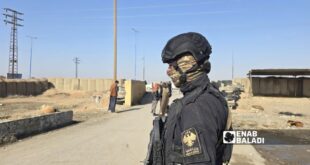 TEHRAN (FNA) Iran and Russia are due to agree on a date for the launch of operation of the Islamic Republic’s first nuclear power plant in the southern port city of Bushehr within the next few weeks, deputy head of Iran’s Atomic Energy Organization said here on Sunday.“We will reach an agreement with Russia about the exact date for the operation and exploitation of Bushehr nuclear power plant in the next few weeks,” Mohammad Saeedi said in an interview with the state-run broadcaster here last night.
TEHRAN (FNA) Iran and Russia are due to agree on a date for the launch of operation of the Islamic Republic’s first nuclear power plant in the southern port city of Bushehr within the next few weeks, deputy head of Iran’s Atomic Energy Organization said here on Sunday.“We will reach an agreement with Russia about the exact date for the operation and exploitation of Bushehr nuclear power plant in the next few weeks,” Mohammad Saeedi said in an interview with the state-run broadcaster here last night.
He further pointed out that Russia would complete the several-stage nuclear fuel delivery process within the same period, adding that the Russian contractor, Atomstroyexport, is now through with the construction of 95% of the plant .
Regarding Iran’s cooperation with the International Atomic Energy Agency and the recent visit to Tehran by the IAEA Chief, Mohamed ElBaradei, the official hoped that Iran’s nuclear issue would become a normal case in the UN nuclear watchdog agency following Tehran’s reply to IAEA questions in next four weeks.
Once questions posed by the IAEA about Iran’s nuclear activities are answered, Tehran’s nuclear dossier would be returned from the Security Council to UN nuclear agency, he hoped.
He said that Iran expects the IAEA to, at least, safeguard its independence and to call on the Security Council to return Tehran’s case to this qualified International body.
Saeedi said that a timeline to address the remaining issues was specified during ElBaradei’s Tehran visit, reminding that the remaining questions are of a limited scope.
He said the agreement by Tehran to address all remaining issues within weeks indicates its good intention, corroborating Iran’s rightful stand.
Meantime, the official reiterated Iran’s resolve to make use of its nuclear science but under a friendly atmosphere and with good intentions.
He further blasted West’s extensive propaganda against Iran’s peaceful nuclear program, and pointed out that western states have intensified efforts, specially since 2003, to block Iran’s nuclear progress by raising suspicions in their smear campaign against the Islamic Republic.
“Westerners oppose all the peaceful nuclear programs of Iran and this could be readily perceived in the suspicions they raised about Iran’s laser-technology enrichment, an issue which was proclaimed as normal by the Agency following Iran’s cooperation (in this regard),” Saeedi said.
The IAEO deputy head reminded a report by the IAEA director general describing Iran as truthful about past nuclear activities.
“The Agency has come to the conclusion that what Iran has announced in its 2003 statement has been fully true and that Iran has taken the required confidence-building measures through its cooperation,” he said, reminding that IAEA’s confidence in Iran’s intentions was built following extensive inspections and verifications of Iran’s nuclear plants and activities by the UN nuclear watchdog, which substantiated Tehran’s full compliance with international rules and regulations.
Saeedi also said that different world countries have now adopted a milder approach towards Iran’s issue after they realized the smear campaign by western states and media against Iran’s peaceful nuclear programs.
The Iran-West nuclear standoff started after the US and a few of its western allies intensified unfounded negative propaganda against Iran’s nuclear drives and demanded Tehran to give up its NPT right of enrichment or face penalties by the UN Security Council.
The Non-Proliferation Treaty (NPT) entitles all signatories, including Iran, to pursue civilian nuclear technology, including uranium enrichment programs used for producing fuel for nuclear power plants.
Tehran has so far rejected West’s demand and is under two sets of UN Security Council sanctions for its refusal to freeze uranium enrichment even after the peaceful nature of its nuclear programs and activities was proved.
Washington is pushing for additional UN penalties despite a recent report by 16 US intelligence bodies that endorsed the civilian nature of Iran’s programs. Following the US National Intelligence Estimate (NIE) and a similar report by the IAEA head in November which praised Iran’s truthfulness about key aspects of its past nuclear activities, Russia and China increased resistance to any further punitive measures by the Security Council.
Tehran says it never worked on atomic weapons and wants to enrich uranium only to produce fuel for reactors that would generate electricity, a claim substantiated by the NIE and IAEA report.
Bush’s attempt to rally international pressure against Iran’s nuclear program has lost steam after the US intelligence report, but he still insists on the same course he picked up years ago and describes Iran as a nuclear threat despite wide opposition to its allegations both inside and outside the US.
Not only many Iranian officials, including President Mahmoud Ahmadinejad, but also many other world nations have called the UN Security Council pressure unjustified, especially in the wake of recent IAEA reports saying Iran had increased cooperation with the agency
 Eurasia Press & News
Eurasia Press & News



